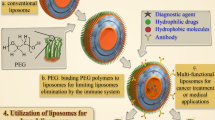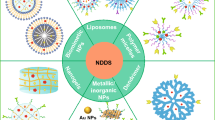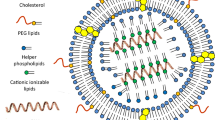Abstract
Purpose
The effect of the combination therapy of curcumin and the herpes simplex virus thymidine kinase (HSVtk) gene using R7L10 as a carrier was evaluated in a glioblastoma animal model.
Methods
Curcumin was loaded into the cores of R7L10 peptide micelles using an oil-in-water emulsion/solvent evaporation method to generate curcumin loaded R7L10 micelles (R7L10-Cur), which were used as a carrier to deliver the HSVtk gene. The plasmid DNA (pDNA)/R7L10-Cur complex was confirmed by gel retardation, heparin competition, and dynamic light scattering analyses. Transfection efficiency and cytotoxicity were measured using luciferase, MTT, and TUNEL assays. Intracellular delivery of curcumin was determined by fluorescence and absorbance. In the glioblastoma animal model, the effects of the intratumoral delivery of curcumin and the HSVtk gene were evaluated according to tumor size, immunohistochemistry, and TUNEL assays.
Results
R7L10-Cur delivered pDNA into the cells more efficiently than PLL and R7L10. In addition, R7L10-Cur delivered curcumin into the cells more efficiently than curcumin alone. The pHSVtk/R7L10-Cur complex induced cell death efficiently both in vitro and in vivo. Likewise, the combination of curcumin and the HSVtk gene using the pHSVtk/R7L10-Cur complex reduced tumor size more efficiently than the pHSVtk/PEI and pHSVtk/R7L10 complexes in a glioblastoma animal model.
Conclusion
R7L10 is an efficient carrier for delivery of curcumin and the HSVtk gene, which may be a useful combination therapy for glioblastoma.







Similar content being viewed by others
References
Dirks P, Bernstein M, Muller PJ, Tucker WS. The value of reoperation for recurrent glioblastoma. Can J Surg J Can de Chir. 1993;36(3):271–5.
Glinski B, Dymek P, Skolyszewski J. Altered therapy schedules in postoperative treatment of patients with malignant gliomas. Twenty year experience of the Maria Sklodowska-Curie Memorial Center in Krakow, 1973-1993. J Neurooncol. 1998;36(2):159–65.
Legler JM, Ries LA, Smith MA, Warren JL, Heineman EF, Kaplan RS, et al. Cancer surveillance series [corrected]: brain and other central nervous system cancers: recent trends in incidence and mortality. J Natl Cancer Inst. 1999;91(16):1382–90.
Tait MJ, Petrik V, Loosemore A, Bell BA, Papadopoulos MC. Survival of patients with glioblastoma multiforme has not improved between 1993 and 2004: analysis of 625 cases. Br J Neurosurg. 2007;21(5):496–500.
Culver KW, Ram Z, Wallbridge S, Ishii H, Oldfield EH, Blaese RM. In vivo gene transfer with retroviral vector-producer cells for treatment of experimental brain tumors. Science. 1992;256(5063):1550–2.
Klatzmann D, Valery CA, Bensimon G, Marro B, Boyer O, Mokhtari K, et al. A phase I/II study of herpes simplex virus type 1 thymidine kinase “suicide” gene therapy for recurrent glioblastoma. Study Group on Gene Therapy for Glioblastoma. Hum Gene Ther. 1998;9(17):2595–604.
Ram Z, Culver KW, Oshiro EM, Viola JJ, DeVroom HL, Otto E, et al. Therapy of malignant brain tumors by intratumoral implantation of retroviral vector-producing cells. Nat Med. 1997;3(12):1354–61.
Rainov NG, Fels C, Droege JW, Schafer C, Kramm CM, Chou TC. Temozolomide enhances herpes simplex virus thymidine kinase/ganciclovir therapy of malignant glioma. Cancer Gene Ther. 2001;8(9):662–8.
Candolfi M, Yagiz K, Wibowo M, Ahlzadeh GE, Puntel M, Ghiasi H, et al. Temozolomide does not impair gene therapy-mediated antitumor immunity in syngeneic brain tumor models. Clin Cancer Res. 2014;20(6):1555–65.
Kato T, Natsume A, Toda H, Iwamizu H, Sugita T, Hachisu R, et al. Efficient delivery of liposome-mediated MGMT-siRNA reinforces the cytotoxity of temozolomide in GBM-initiating cells. Gene Ther. 2010;17(11):1363–71.
Yang ZZ, Li JQ, Wang ZZ, Dong DW, Qi XR. Tumor-targeting dual peptides-modified cationic liposomes for delivery of siRNA and docetaxel to gliomas. Biomaterials. 2014;35(19):5226–39.
Goel A, Kunnumakkara AB, Aggarwal BB. Curcumin as “Curecumin”: from kitchen to clinic. Biochem Pharmacol. 2008;75(4):787–809.
Kunnumakkara AB, Anand P, Aggarwal BB. Curcumin inhibits proliferation, invasion, angiogenesis and metastasis of different cancers through interaction with multiple cell signaling proteins. Cancer Lett. 2008;269(2):199–225.
Zhuang W, Long L, Zheng B, Ji W, Yang N, Zhang Q, et al. Curcumin promotes differentiation of glioma-initiating cells by inducing autophagy. Cancer Sci. 2012;103(4):684–90.
Khaw AK, Hande MP, Kalthur G, Hande MP. Curcumin inhibits telomerase and induces telomere shortening and apoptosis in brain tumour cells. J Cell Biochem. 2013;114(6):1257–70.
Das RK, Kasoju N, Bora U. Encapsulation of curcumin in alginate-chitosan-pluronic composite nanoparticles for delivery to cancer cells. Nano Nanotechnol Biol Med. 2010;6(1):153–60.
Sahu A, Bora U, Kasoju N, Goswami P. Synthesis of novel biodegradable and self-assembling methoxy poly(ethylene glycol)-palmitate nanocarrier for curcumin delivery to cancer cells. Acta Biomater. 2008;4(6):1752–61.
Park JH, Kim HA, Park JH, Lee M. Amphiphilic peptide carrier for the combined delivery of curcumin and plasmid DNA into the lungs. Biomaterials. 2012;33(27):6542–50.
Kim HA, Park JH, Yi N, Lee M. Delivery of Hypoxia and Glioma Dual-Specific Suicide Gene Using Dexamethasone Conjugated Polyethylenimine for Glioblastoma-Specific Gene Therapy. Mol Pharm. 2014:In press.
Lee M, Nah JW, Kwon Y, Koh JJ, Ko KS, Kim SW. Water-soluble and low molecular weight chitosan-based plasmid DNA delivery. Pharm Res. 2001;18(4):427–31.
Lemkine GF, Goula D, Becker N, Paleari L, Levi G, Demeneix BA. Optimisation of polyethylenimine-based gene delivery to mouse brain. J Drug Target. 1999;7(4):305–12.
Dhandapani KM, Mahesh VB, Brann DW. Curcumin suppresses growth and chemoresistance of human glioblastoma cells via AP-1 and NFkappaB transcription factors. J Neurochem. 2007;102(2):522–38.
Kang SK, Cha SH, Jeon HG. Curcumin-induced histone hypoacetylation enhances caspase-3-dependent glioma cell death and neurogenesis of neural progenitor cells. Stem Cells Dev. 2006;15(2):165–74.
Lee J, Hyun H, Kim J, Ryu JH, Kim HA, Park JH, et al. Dexamethasone-loaded peptide micelles for delivery of the heme oxygenase-1 gene to ischemic brain. J Control Release. 2012;158:131–8.
Das L, Vinayak M. Anti-carcinogenic action of curcumin by activation of antioxidant defence system and inhibition of NF-kappaB signalling in lymphoma-bearing mice. Biosci Rep. 2012;32(2):161–70.
Das L, Vinayak M. Curcumin attenuates carcinogenesis by down regulating proinflammatory cytokine interleukin-1 (IL-1alpha and IL-1beta) via modulation of AP-1 and NF-IL6 in lymphoma bearing mice. Int Immunopharmacol. 2014;20(1):141–7.
Das L, Vinayak M. Long-term effect of curcumin down-regulates expression of tumor necrosis factor-alpha and interleukin-6 via modulation of E26 transformation-specific protein and nuclear factor-kappaB transcription factors in livers of lymphoma bearing mice. Leukemia & lymphoma. 2014.
ACKNOWLEDGMENTS AND DISCLOSURES
This work was financially supported by a grant from the National Research Foundation of Korea, funded by the Ministry of Science, ICT and Future Planning (Grant number, 2013K000257 and NRF-2013R1A1A2059236) and a grant from the Ministry of Health and welfare in Korea (Grant number, HI12C-1210-010013).
Author information
Authors and Affiliations
Corresponding author
Rights and permissions
About this article
Cite this article
Park, J.H., Han, J. & Lee, M. Thymidine Kinase Gene Delivery Using Curcumin Loaded Peptide Micelles as a Combination Therapy for Glioblastoma. Pharm Res 32, 528–537 (2015). https://doi.org/10.1007/s11095-014-1482-4
Received:
Accepted:
Published:
Issue Date:
DOI: https://doi.org/10.1007/s11095-014-1482-4




